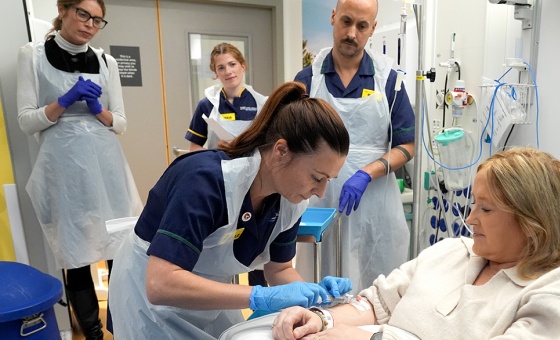This is the last article you can read this month
You can read more article this month
You can read more articles this month
Sorry your limit is up for this month
Reset on:
Please help support the Morning Star by subscribing here
HUNDREDS of people gathered for a “people’s march” on climate in Nairobi today, as the first African Climate Summit opened its doors to the heads of state.
Protesters held signs demanding the end to fossil fuels, with one reading: “Stop the neocolonial scramble for oil and gas in Africa.”
Kenyan President William Ruto’s government and the African Union launched the ministerial session.
More than a dozen heads of state began to arrive for talks that are expected to call for more global influence, financing and support to tackle climate change.
The continent of some 1.3 billion people is affected the most by rising temperatures, even though it contributes to it the least.
Speaking at the launch, which included young speakers demanding a bigger voice, Mr Ruto said: “For a very long time we have looked at this as a problem.”
He said that there are “immense opportunities as well,” including Africa’s huge mineral wealth and the ideal of shared prosperity.
“We are not here to catalogue grievances,” he said.
But other speakers voiced frustrations that the continent was being asked to develop cleaner ways than the world’s richest countries, which have long produced most of the emissions, and to do it while much of the support that has been pledged has not appeared.
Mithika Mwenda of the Pan African Climate Justice Alliance said: “This is our time,” claiming that the annual flow of climate assistance to the continent is a tenth or less of what is needed and a “fraction” of the budget of some polluting companies.
United Nations Framework Convention on Climate Change executive secretary Simon Stiell called for the immediate delivery of the $100bn (£80bn) of climate finance pledged annually by rich countries to developing ones.
More than $83bn (£65bn) in climate financing was given to poorer countries in 2020, a 4 per cent increase from the previous year but still short of the goal set in 2009.
“We have an abundance of clean, renewable energy and it’s vital that we use this to power our future prosperity,” Mohamed Adow of Power Shift Africa said ahead of the summit.
“But to unlock it, Africa needs funding from countries that have got rich off our suffering.”
The UN has estimated that loss and damage in Africa due to climate change are projected to be between $290bn (£230bn) and $440bn (£349bn) between 2020 and 2030, depending on the degree of warming.










